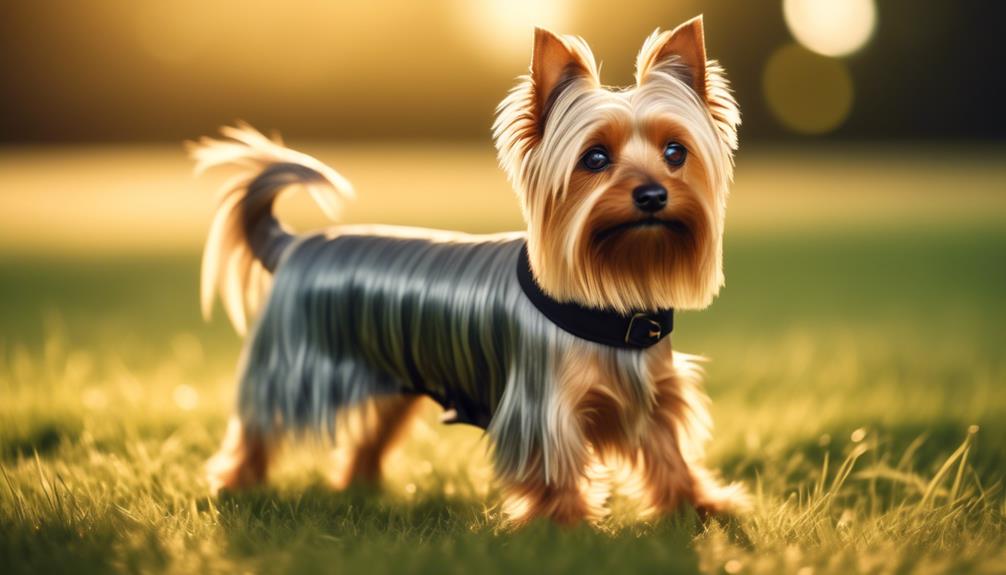
Are you curious about the fascinating world of Silky Terriers?
These charming canines possess a unique set of qualities and characteristics that make them stand out from the pack.
From their elegant appearance to their spirited nature, there is much to discover about this delightful breed.
So, if you’re ready to embark on a journey filled with intriguing information and insights, join us as we unravel the mysteries of the Silky Terrier dog breed.
You won’t want to miss what’s in store!
Key Takeaways
- Silky Terriers are a small breed of toy dogs with a long, silky coat that requires regular grooming.
- They have a playful and active temperament, making them good companions for families and other pets.
- Silky Terriers need daily exercise and consistent training to prevent behavioral issues and aggression towards other dogs.
- They adapt well to apartment living, but their energy level and behavior should be considered to ensure a harmonious living environment with neighbors.
Origin and History
The Silky Terrier breed originated in Australia, being developed through the breeding of Yorkshire Terriers and Australian Terriers. This crossbreeding resulted in a small and elegant dog with a long, silky coat.
The Silky Terrier is known for its blue and tan coloring, which adds to its unique appearance. Originally, these dogs were bred to work on farms, hunting small prey such as rodents. However, over time, they transitioned into companion dogs due to their playful, active, and affectionate nature.
The Silky Terrier is an intelligent breed that’s quick to learn and eager to please. They’re good with children and other pets, but may exhibit aggression towards other dogs. Regular exercise and consistent training are essential for their well-being and to prevent behavioral issues.
See another Dog breed profile.
Skye Terrier Dog Breed
Size and Weight

After learning about the origin and history of the Silky Terrier breed, let’s now explore their size and weight.
Silky Terriers are a small breed, standing at about 9 to 10 inches tall at the shoulder. In terms of weight, they typically range from 8 to 10 pounds.
As toy dogs, they’re compact and lightweight, making them easy to handle and carry. Despite their small size, Silky Terriers possess a sturdy and well-proportioned body.
Their size makes them suitable for various living situations, including apartments. Whether you have limited space or prefer a smaller companion, the Silky Terrier’s size and weight make them a great choice for those seeking a petite and portable pet.
Breed Group Classification

When considering the Silky Terrier breed, it is important to understand their classification within the breed groups. Silky Terriers are classified as Toy dogs, which are small, companion breeds known for their affectionate nature and compact size. They are often favored by individuals and families living in apartments or small spaces due to their adaptability. Toy dogs are typically bred for their friendly and sociable personalities, making them great companions for both adults and children. To give you a better idea of the different breed groups, here is a table outlining some common characteristics:
| Breed Group | Description | Example Breeds |
|---|---|---|
| Toy | Small, companion breeds | Chihuahua, Pomeranian |
| Sporting | Energetic, active, and good hunters | Golden Retriever, Lab |
| Working | Strong, intelligent, and versatile | Boxer, Doberman |
| Herding | Intelligent, obedient, and agile | Border Collie, Corgi |
| Hound | Sighthounds or scent hounds | Greyhound, Beagle |
Understanding the breed group classification can help you identify the traits and characteristics that are commonly found in Silky Terriers and other breeds.
Lifespan and Longevity

On average, Silky Terriers have a lifespan of 12-15 years, making them a long-living and cherished companion for many years to come. They’re known for their longevity and can provide love and companionship for a significant portion of your life.
Here are a few key factors that contribute to their lifespan:
- Genetic Factors:
- Silky Terriers are generally healthy dogs with few genetic health issues.
- Responsible breeders prioritize the health and well-being of their dogs, resulting in healthier puppies.
- Care and Attention:
- Regular veterinary check-ups and vaccinations are important for maintaining their health.
- Providing a balanced diet, regular exercise, and mental stimulation can contribute to their overall well-being.
Coat Characteristics
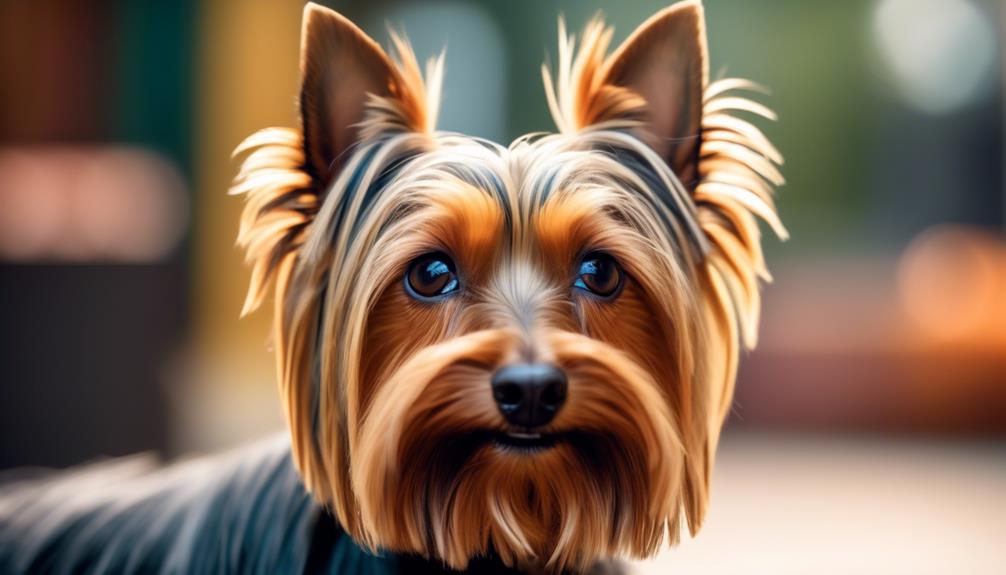
The Silky Terrier’s coat is known for its long, straight, and silky texture, which adds to their charm and elegance. This coat requires regular maintenance to keep it looking its best. Daily brushing is necessary to prevent matting, and professional grooming every 6-8 weeks is recommended.
Silky Terriers shed about as much as a human does on a daily basis, so regular brushing helps to manage the shedding. Additionally, grooming helps maintain the appearance and health of the coat. By prioritizing regular brushing and professional grooming, you can ensure that your Silky Terrier’s coat remains beautiful and healthy.
Temperament and Personality
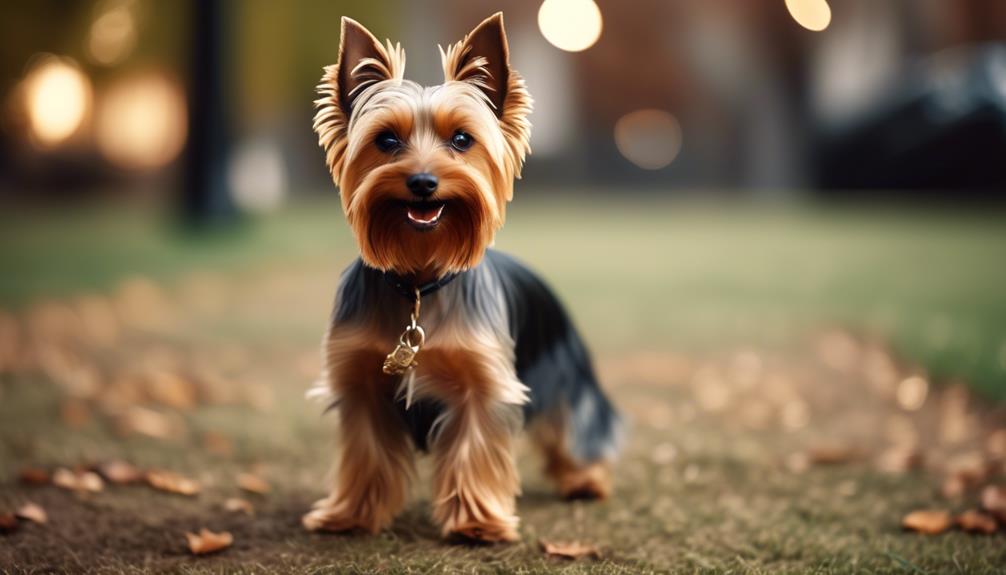
Silky Terriers are known for their playful, active, and intelligent temperament. They have a natural curiosity and love to explore their surroundings.
Here are some key traits of their personality:
- Loyal and affectionate: Silky Terriers form strong bonds with their owners and enjoy being a part of the family.
- Good with children and other pets: They are generally friendly and get along well with children and other animals, although they may be aggressive towards other dogs.
- Eager to please and quick learners: Silky Terriers are intelligent and respond well to positive reinforcement training.
- Crave companionship: They love to be around their human companions and may become anxious or exhibit destructive behavior if left alone for long periods.
- Need exercise and mental stimulation: Silky Terriers require daily exercise and mental stimulation to prevent boredom and maintain their physical and mental well-being.
Understanding these characteristics will help you provide the right environment and care for your Silky Terrier.
Compatibility With Children and Pets
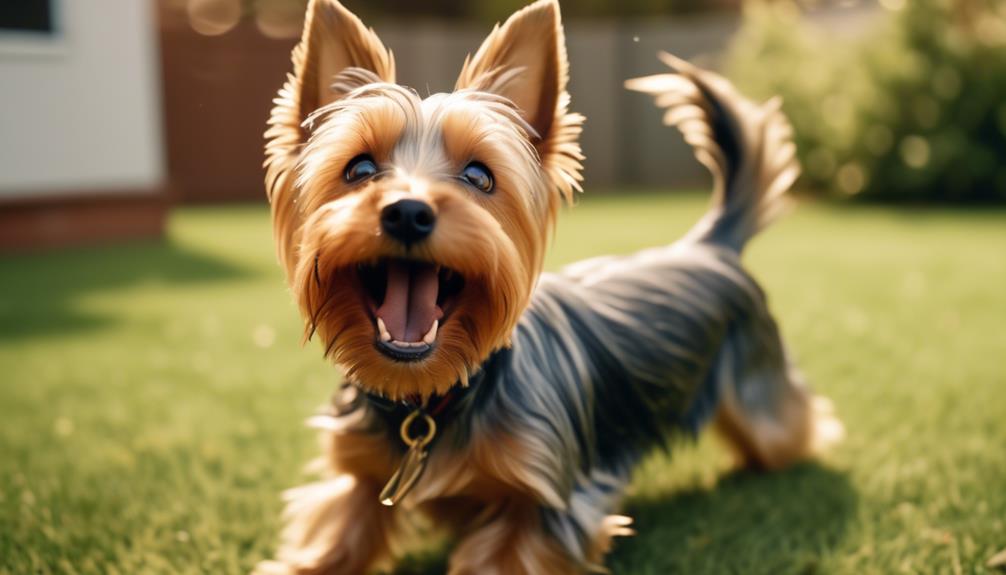
When considering the compatibility of Silky Terriers with children and pets, it’s important to understand their friendly and sociable nature.
Silky Terriers are known to be good companions for children, as they’re playful, active, and affectionate. They enjoy spending time with kids and can handle their energy levels. However, it’s crucial to supervise interactions between young children and Silky Terriers to ensure that both parties are gentle and respectful.
In terms of compatibility with other pets, Silky Terriers generally get along well with other animals, especially if they’re properly socialized from a young age. They can coexist peacefully with cats and other small pets, but they may display aggression towards other dogs, especially those of the same sex. Proper introductions and training are necessary to establish harmonious relationships between Silky Terriers and other pets in the household.
Exercise Needs and Training
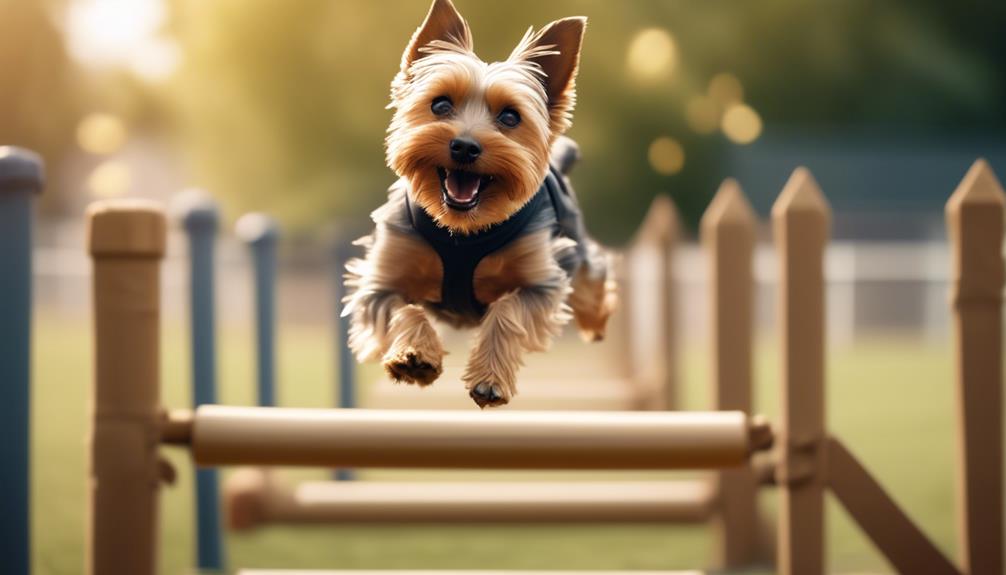
To ensure the optimal health and well-being of your Silky Terrier, it’s important to prioritize their exercise needs and training. Here are some key points to consider:
- Exercise Needs:
- Silky Terriers require 30-60 minutes of exercise per day.
- This can be achieved through brisk walks, indoor playtime, or interactive games.
- Training:
- Silky Terriers are easy to train with positive reinforcement.
- They’re eager to please and quick learners.
- Consistent training is important to establish good behavior and prevent aggression towards other dogs.
Grooming Requirements
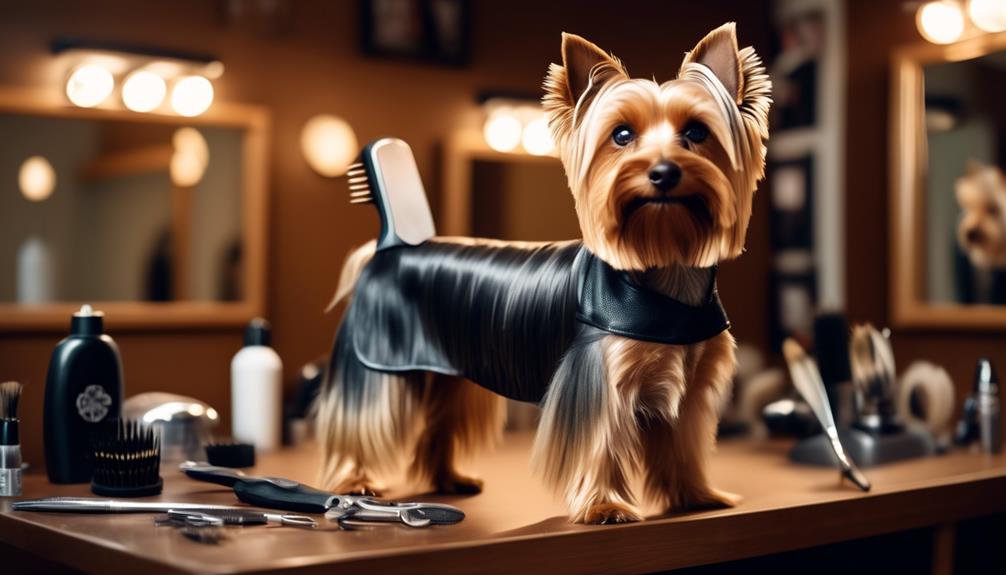
Regular grooming is essential for maintaining the health and appearance of the Silky Terrier’s long, silky coat. Silky Terriers have a beautiful coat that requires regular brushing to prevent matting. In addition to brushing, professional grooming every 6-8 weeks is recommended to keep the coat in top condition. Silky Terriers shed about as much as a human does on a daily basis, so daily brushing is necessary to prevent matting. Regular grooming not only helps to prevent tangles and matting but also keeps the coat looking shiny and healthy. To give you a better idea of the grooming requirements, refer to the table below:
| Grooming Requirements | Frequency |
|---|---|
| Brushing | Daily |
| Bathing | Every 2-4 weeks |
| Professional grooming | Every 6-8 weeks |
| Nail trimming | Every 2-4 weeks |
Adaptability to Apartment Living

Silky Terriers are highly adaptable to apartment living due to their small size, low energy level, and polite demeanor towards neighbors. Here are some reasons why they thrive in apartments:
- Size:
Silky Terriers are small in size, standing at 9-10 inches tall and weighing 8-10 pounds. This makes them suitable for smaller living spaces.
- Energy Level:
Silky Terriers have a low energy level, which means they don’t require a large yard or extensive exercise. Indoor playtime and brisk walks can fulfill their exercise needs.
- Polite Demeanor:
Silky Terriers are known to be quiet and well-mannered. They’re unlikely to cause disturbances or nuisance to neighbors.
Considering these factors, Silky Terriers make excellent companions for apartment dwellers. Just be sure to prioritize their exercise needs and consider the comfort of your neighbors when selecting a dog for apartment living.
Frequently Asked Questions
Are Silky Terriers Hypoallergenic?
Yes, silky terriers are hypoallergenic. Their long, silky coat doesn’t shed much and produces fewer allergens. Regular grooming and brushing will help reduce the risk of allergic reactions.
How Often Should Silky Terriers Be Bathed?
You should bathe your Silky Terrier every 4-6 weeks. Regular bathing helps to keep their coat clean and healthy. Use a gentle dog shampoo and make sure to thoroughly rinse to avoid any skin irritation.
Do Silky Terriers Have Any Specific Health Concerns?
Silky Terriers have a few specific health concerns you should be aware of. These include patellar luxation, Legg-Calve-Perthes disease, and tracheal collapse. Regular veterinary check-ups and a healthy lifestyle can help prevent and manage these issues.
Can Silky Terriers Be Left Alone for Long Periods of Time?
No, Silky Terriers cannot be left alone for long periods of time. They crave companionship and may become anxious or exhibit destructive behavior when left alone. They thrive in environments where they receive regular attention and interaction.
Are Silky Terriers Prone to Excessive Barking?
Yes, Silky Terriers can be prone to excessive barking. It’s important to provide them with mental stimulation, exercise, and training to help manage their barking behavior and prevent it from becoming a problem.
Conclusion
In conclusion, the Silky Terrier is a wonderful choice if you’re looking for a small and stylish companion. They have a playful and active nature that will bring joy to your life for many years. Additionally, although they may require regular grooming, their long, silky coats are sure to turn heads wherever you go.
Overall, the Silky Terrier is an intelligent and loyal breed that will make a delightful addition to any household.




